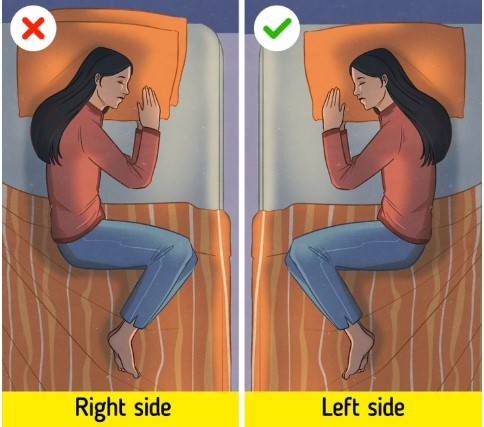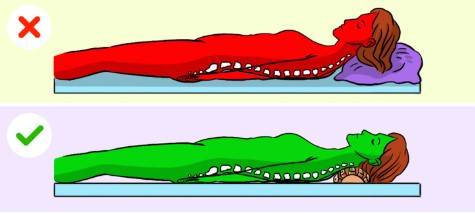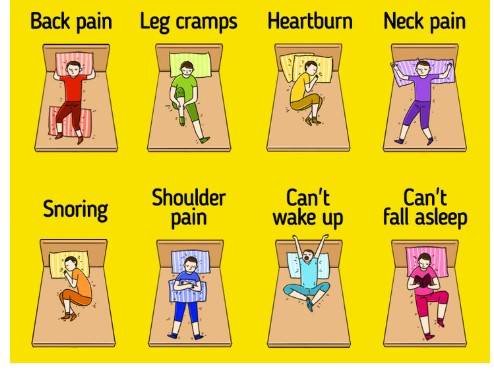Sleep is essential for our physical and mental health, and finding the right sleep position can make all the difference.
Different sleeping positions can impact our sleep quality and alleviate various problems.In this article, we’ll explore the most popular sleeping problems and what sleeping positions can help you achieve a better night’s sleep.

1. Heartburn
If you have acid reflux, it’s important to choose sleeping positions that won’t worsen your symptoms.
Sleeping on your left side can help reduce the likelihood of acid reflux by keeping your stomach below your esophagus.
This can help prevent stomach acid from flowing back and causing discomfort.
Elevating the head of your bed by 6 to 8 inches can also help reduce the risk of acid reflux.
This can help prevent acid reflux by keeping the stomach below the esophagus.
This tip will also help if you prefer sleeping on your back.

2. Neck pain
In general, it’s recommended to sleep on your back or on your side with a pillow to support your neck and relieve pressure on the spinal joints.
If you sleep on your side, you can use a pillow that is thick enough to keep your neck and spine in a neutral position, and not too high or too low.
You can also place a pillow between your knees to keep your spine in a neutral position and reduce pressure on your hips and lower back.
If you sleep on your back, you can use a pillow that is not too high or too low to keep your neck and spine in a neutral position.
A contoured pillow that supports the natural curve of your neck can be helpful.

3. Can’t fall asleep, or can’t wake up
The best sleeping position that can help you fall asleep varies from person to person, and it’s ultimately a matter of personal preference.
However, if you’re having trouble with insomnia, here are a few things you can try:
Create a relaxing bedtime routine. Develop a calming ritual that helps you unwind before bedtime. This could include taking a warm bath, reading a book, or practicing relaxation techniques, like deep breathing or meditation.
Avoid stimulating activities, such as using electronic devices, watching TV, or engaging in intense exercise in the hours leading up to bedtime.
Make sure your sleeping environment is conducive to sleep by making your bedroom dark, quiet, and cool. You can also consider investing in comfortable bedding and pillows.

4. Shoulder pain
If you have shoulder pain, in general, it’s recommended to sleep on your back, so the tension on your shoulders will be lower.
You can also hug a pillow or use a small one to support your affected shoulder.

5. Back pain
If you have back pain, try sleeping on your back with a pillow under your knees.
This position can help relieve pressure on your lower back.
Place a small pillow or rolled-up towel under your knees to help maintain the natural curve of your spine.
Avoid sleeping on your stomach.
Sleeping on your stomach can strain your neck and back.
If you prefer this position, try placing a pillow under your pelvis and lower abdomen to help reduce the strain on your back.

6. Snoring
If you snore, it’s generally recommended to sleep on your side rather than on your back.
When you sleep on your back, gravity can cause the soft tissue in your throat to relax and block your airway, leading to snoring.
Sleeping on your side can also help to keep your airway open and reduce snoring.
Additionally, you can try raising your head a bit by using an extra pillow or lifting the bed’s head.

7. Leg cramps
Though leg cramps are harmless, there’s no need to suffer from pain, as they can last up to 10 minutes.
When you experience a night leg cramp, try stretching your leg muscles gently.
You can do this by flexing your foot upward toward your knee.
This can help ease the cramp and relieve the pain.
Also, massage the affected area with your hands to help the muscles relax.

Bonus: People share unusual ways to help them fall asleep.
